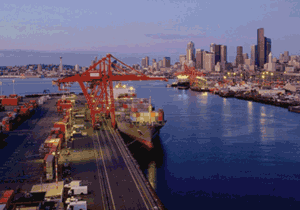Ports Look to Biodiesel to Help Cut Carbon Emissions

June 9, 2009
U.S. ports and waterways handle more than 2 billion tons of cargo every year, but as they move the goods that drive the economy they are also emitting huge amounts of air pollution. A recent report by Energy Futures Inc., "Container Ports and Air Pollution," found that U.S. and international container shipping ports are among the world's biggest sources of air pollution and greenhouse gas emissions. The report examined the top 10 container ports in the U.S. and found that the alternative fuels are gaining momentum as a more environmentally responsible way to move goods. Biodiesel has been recognized as an option to immediately reduce emissions from diesel equipment.
Two of the top 10 ports-Seattle and Tacoma, Wash., on the Puget Sound-both rely on biodiesel to power their diesel fleets. The Port of Seattle began using B99 in 2006 to fuel its fleet of approximately 70 diesel vehicles and equipment. In addition, four of the container terminals at the port use biodiesel. The Port of Tacoma uses blend levels ranging from B5 to B50, and Husky Terminal is the first terminal at the port to use biodiesel.
Of course, ports provide a critical link in global trade. For example, The American Association of Port Authorities points out that "one of the most popular beverages-coffee-would not be readily available without ports. Coffee beans arrive on ships and are often roasted at facilities on port property. The roasted beans are then moved by truck or rail to inland markets."
While we would certainly not want to do without coffee, we could do with less air pollution and expect even more ports to look to biodiesel as a way to easily and immediately reduce their carbon footprint.
Two of the top 10 ports-Seattle and Tacoma, Wash., on the Puget Sound-both rely on biodiesel to power their diesel fleets. The Port of Seattle began using B99 in 2006 to fuel its fleet of approximately 70 diesel vehicles and equipment. In addition, four of the container terminals at the port use biodiesel. The Port of Tacoma uses blend levels ranging from B5 to B50, and Husky Terminal is the first terminal at the port to use biodiesel.
Of course, ports provide a critical link in global trade. For example, The American Association of Port Authorities points out that "one of the most popular beverages-coffee-would not be readily available without ports. Coffee beans arrive on ships and are often roasted at facilities on port property. The roasted beans are then moved by truck or rail to inland markets."
While we would certainly not want to do without coffee, we could do with less air pollution and expect even more ports to look to biodiesel as a way to easily and immediately reduce their carbon footprint.
Advertisement
Advertisement
Upcoming Events





